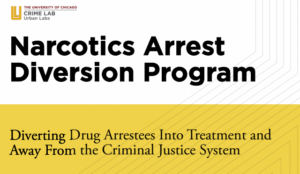Juvenile Justice Agency Collaboration (JJAC)

The Crime Lab is supporting the Juvenile Justice Agency Collaboration (JJAC), a multi-agency partnership aimed at increasing collaboration within the juvenile justice system and minimizing the negative impact of the juvenile justice system on later life outcomes.
Challenge
Chicago youth involved in the juvenile justice system are more likely to be from communities that have been undermined by poverty and systemic barriers to success for many decades. Involvement in the juvenile justice system imposes further barriers to accessing education, housing, employment, financial aid, and other services that protect their right to safety and stability.
Opportunity
Effective communication and coordination among agency staff in the juvenile justice system, such as police, prosecutors, and probation officers, have the potential to mitigate the impact of some of these barriers to success. The Crime Lab is supporting the JJAC’s efforts by bringing together data from multiple agencies to help make informed, data-driven policy recommendations for improving the juvenile justice system.
Project overview
The Juvenile Justice Agency Collaboration (JJAC) is a multi-agency partnership between the Chicago Department of Family and Support Services, Chicago Mayor’s Office, Chicago Police Department, Chicago Public Schools, Cook County Juvenile Probation and Court Services, Cook County Juvenile Temporary Detention Center, Cook County Public Defender’s Office, Cook County State’s Attorney’s Office, Illinois Department of Juvenile Justice, and Juvenile Justice Division of the Circuit Court of Cook County. In complement to comprehensive reforms which are necessary to dismantle systemic barriers, the JJAC seeks to discover and implement policies to divert youth away from the juvenile justice system and increase equity and care quality for the youth who are not diverted.
Years Active
2017 – 2022
Topics
Project Leads
Ashna Arora
Research Director

Khoa Nguyen
Analytics Manager

Nicole Gillespie
Director of Data Partnerships


Empirical Analysis of Prediction Mistakes in New York City Pretrial Data

Brookings Institution Commentary: Making the invisible epidemic visible
Using new data from a large urban trauma center in Chicago, we document substantial under-reporting of domestic violence at the time of receiving medical care.

Video about the Narcotics Arrest Diversion Program
This video provides an overview of the Crime Lab’s evaluation of the Narcotics Arrest Diversion Program, a program implemented by the community behavioral health provider Thresholds.

NADP Research Brief
Research Brief for the Narcotics Arrest Diversion Program.
Due to the limited purview of each agency in the criminal justice system, staff within an agency are often unable to see how other agencies handle cases, reducing their ability to detect and address the systemic barriers and challenges that often lead to continued involvement in the system. The absence of effective coordination inhibits these agencies from being able to provide the young people they serve with appropriate, equitable care. The ability to divert young people away from the justice system—and better serve those who are not diverted—also requires a fuller understanding of the unique experiences and needs of youth as they interact with and progress through the system.
The University of Chicago Crime Lab is supporting the JJAC’s efforts to increase collaboration between juvenile justice system agencies by providing technical assistance and ongoing analytic support to the JJAC group. The Crime Lab brings together data from multiple agencies to answer questions identified by the JJAC members so that agencies can make informed, data-driven policy recommendations to improve the juvenile justice system. The ultimate goal of this assistance is to ensure that youth receive adequate supports and to minimize the negative impact of the juvenile justice system on a youth’s later life outcomes. A secondary goal of this project is to disseminate insights to key stakeholders outside of the JJAC, including service providers and public committees that are focused on supporting Chicago’s youth.
